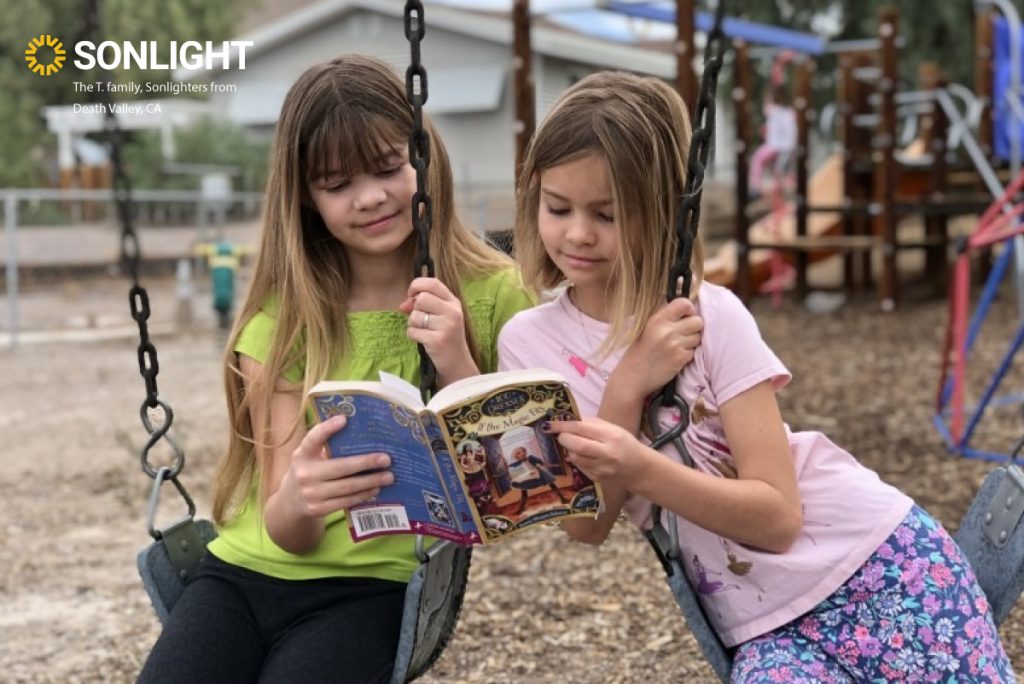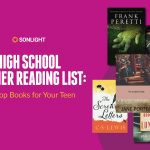Discover fun summer reading activities for elementary school students—from our Summer Reading challenge to word dice and sight word games.

The Importance of Summer Reading
Summer break doesn't have to mean a break from learning and growth. Encouraging your child to read during the summer months is one of the most valuable investments you can make in their educational journey.
My son reads everywhere—his bedroom, the kitchen table, the living room, and the car. He grabs books every time we go somewhere. This is the first time he has asked me to assemble a summer reading list for him to choose from at the end of the school year. He says he loves Sonlight books!
-Linda B., Sonlighter from Denver, CO, USA
Summer reading can benefit your child and enrich their education in many ways, including by:
- Reinforcing the idea that reading is a year-long, fun activity. Sonlighters love to read; a key part of our curriculum involves turning even reluctant readers into book lovers. Reading during the summer reinforces your child’s love of reading and allows them to pick stories they’re genuinely interested in. Having the freedom to choose more of their books can help them connect reading with pleasure instead of school work or obligation.
- Making reading a lifelong habit. Summertime is a great time to incorporate reading as a part of your child’s (and your own) routine, even without having schoolwork and assignments attached. Research proves that consistency is key when developing a love of reading (and new habits), and reading itself benefits your child's mental and physical health as well as their literacy skills.
- Maintaining reading skills. Children can lose months of their reading process over the summer break if they don’t continue honing their skills. To avoid this summer slide, parents should encourage regular summer reading. Just like athletes need to stay in shape during the off-season, young readers need to exercise their reading muscles to maintain fluency and speed. Even 15-20 minutes of reading per day can make a significant difference in preserving hard-earned reading abilities.
- Building your child’s vocabulary. As always, reading can introduce your children to new words and expand their vocabulary naturally. Unlike vocabulary worksheets, reading allows kids to encounter words multiple times in different situations, helping them truly understand meaning and usage. Books often contain richer language than typical conversation, introducing children to descriptive words, varied sentence structures, and sophisticated concepts.
- Improving reading comprehension. Summertime means more freedom to sit with your books. Children can reread their favorite passages and even their favorite books, think about character motivations, and make connections between different stories or their own experiences. This relaxed approach to reading helps develop critical thinking skills and a deeper understanding of text. Children learn to visualize scenes, predict outcomes, and analyze themes, which are all essential comprehension skills that will serve them well in future academic work.
- Exploring interests in certain topics. Summer reading gives children the freedom to dive deep into subjects that fascinate them, whether it's dinosaurs, cooking, sports, or fantasy worlds. This self-directed exploration helps kids develop expertise and confidence in areas they're passionate about. When children read about topics they love, they're more engaged and also retain information better.
"We are glad we had the motivation to stick to a reading program, filling out the charts, setting goals, and earning prize incentives. I don’t care how old your kiddos are, keep reading aloud or allow them to read to you. Reading more is a surefire way for them to grow in their knowledge and understanding of the world around us."
– Whitni V., USA
Summer Reading Activities: Fun for the Whole Family
Engaging in fun summer reading activities can get your child excited about reading. Some activities everyone will love include:
- Summer reading programs. Structured reading programs provide the perfect framework to keep your child motivated and on track throughout the summer months. These programs often include goal-setting, progress tracking, and exciting rewards that make reading feel like a game rather than work. Many local libraries and bookstores offer programs, and the social aspects of summer reading programs can be motivational for kids with a competitive nature. If you’re looking for a faith-based reading challenge, Sonlight
- Make reading come alive with food. Transform your kitchen into a literary adventure by preparing foods mentioned in your child's favorite books! Whether it's making Turkish Delight after reading "The Lion, the Witch and the Wardrobe" or baking cookies like the ones in "If You Give a Mouse a Cookie," cooking connects stories to real-world experiences. This multi-sensory approach helps children remember plot details and characters while developing practical life skills in the kitchen. It’s also just a fun way to spend time together as a family.
- Read books set in a different country and make a book travel passport. Create an exciting literary journey around the world by reading books set in various countries and documenting each "trip" in a homemade passport. Children can stamp their passports after finishing each book, draw pictures of the settings, and learn interesting facts about each country they "visit" through literature. If you have a summer trip planned, you can make this even more personal and fun by reading about your destination!
- Create a summer reading journal. A personalized reading journal gives children a special place to record their thoughts, favorite quotes, and reactions to the books they read. They can rate books, draw pictures of their favorite characters, or write alternative endings to stories that didn't quite satisfy them. This reflective practice helps improve comprehension and critical thinking skills while creating a wonderful keepsake of their summer reading journey.
- Play sight word games. Turn essential reading skills practice into active, outdoor fun with games that get kids moving while learning:
- Sight word balloon fight: Fill water balloons with sight words written on them; allow children to grab balloons with words they read aloud for their arsenal. Then, let the water balloon fight begin. If you have older children, you can write more difficult vocabulary words on balloons instead and ask them to define them to get balloons.
- Sight words Twister game: Create a giant Twister game in your driveway using chalk to write sight words in each circle. Then, play a fun game of Twister.
- Make word family dice. Craft simple learning tools by creating dice with word families (like -at, -an, -op) that children can roll to create new words and practice phonics skills. Use large foam dice or make your own from cardboard boxes, writing different word endings on each side. Children can roll the dice and race to think of words that match the pattern, or use multiple dice to create silly sentences.
"The kids were so excited to earn Sonlight shirts through the summer reading program! We are thankful for the Sonlight resources that made our summer reading fun and exciting."
-Angela M., Nashville, TN, USA
Earn a reward when you submit photos of your completed Summer Reading Challenge Kits! This year, those who complete the challenge can receive a Sonlight book light.








